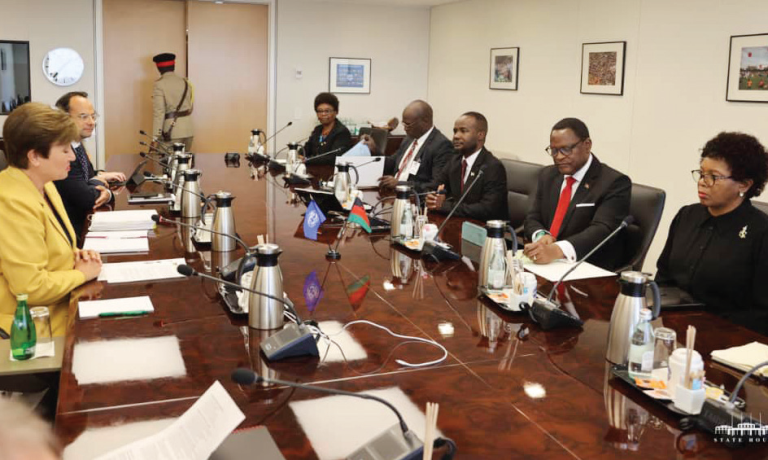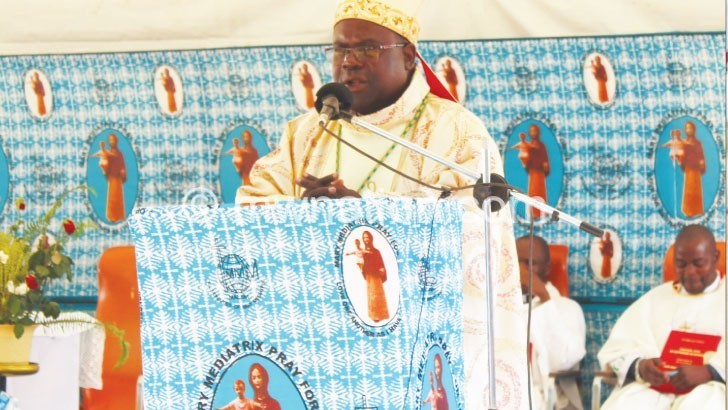Malawi is waiting with bated breath as the International Monetary Fund (IMF) Executive Board considers Lilongwe’s bid for the Rapid Credit Facility (RCF) under the food shock window and Staff Monitored Programme (STP) amid government’s push for balance of payment relief.
Minister of Finance and Economic Affairs Sosten Gwengwe as well as IMF sources indicated last evening that Malawi submitted its paper work on the two packages and that the IMF board was still assessing Capital Hill’s case.
Chakwera during a previous meeting with IMF management
The latest position on Malawi’s quest for Fund-supported facilities come amid a flurry of posts on social media between Monday evening and Tuesday that the country, which is facing balance of payments challenges and desperately needs to stabilise its economy, had secured the emergency deal pending conclusion of Extended Credit Facility (ECF) facility deal with IMF.
But Gwengwe, who alongside Treasury and Reserve Bank of Malawi officials met the IMF team in Washington DC to discuss the fate of the programme on Monday, disputed contents of news items quoting a statement from the IMF’s mission visit to Malawi last week.
In a brief written response via WhatsApp, the minister said: “After mission negotiations, the IMF mission team takes the papers to their board and this is where things are.”
Some sources separately told The Nation that there was no communication yet from the executive board in Washington on the approval of the RCF.
The sources indicated that an official communication will be issued accordingly.
Malawi is seeking a new ECF after cancelling the previous arrangement in September 2020 in search of a fresh start barely two months after the Tonse Alliance administration led by President Lazarus Chakwera ascended to power.
Gwengwe: The paperwork is with the IMF board
The administration found what the IMF said were serious episodes of misreporting at the Reserve Bank of Malawi, particularly on reserve position figures whose clean up the IMF, alongside debt restructuring, has put as pre-conditions for a return to a formal economic programme.
Through the cancellation, Malawi forfeited $70 million and total access under the cancelled three-year ECF was about $145 million, including the initial resource envelope of about $112.3 million approved in April 2018 plus $40 million under Augmentation of Access approved in November 2019.
Treasury and RBM have indicated that they have been working hard to fulfill the ECF requirements such as debt sustainability and restructuring plan even as the push for the RCF under which the IMF provides concessional and low-access financial assistance to low income countries facing an urgent balance of payments.
Under the RCF, the IMF can also provide support in various circumstances, including external shocks, natural disasters and other emergencies according to IMF guidelines.
Last week, at the end of the four-day mission to Malawi, IMF officials led by mission chief to Malawi Mika Saito indicated that discussions on a possible programme with Malawi were ongoing and will continue in Washington DC on the sidelines of the IMF-World Bank meetings scheduled for October 11 to 17.
She described the discussions as productive and provided a veiled flicker of hope that Malawi stands a chance to clinch both the RCF and ECF which is crucial to invite more donors.
Saito said: “We had productive discussions with the authorities and made good progress on their request for a disbursement under the Food Shock Window of up to 50 percent of quota and the Staff Monitored Programme with Executive Board Involvement.
“The disbursement under the Food Shock Window combined with the Staff Monitored Programme would help address Malawi’s urgent financing needs and support reforms while providing the country with sufficient time to make progress on the debt restructuring process.”
During this period, government had hoped the July IMF board meeting would approve the ECF which unfortunately was not approved as the country needed to restore macroeconomic stability, ensure public debt sustainability and advance structural reforms to support sustainable and inclusive growth as well as address the impact of the Covid-19 pandemic and spillovers from war in Ukraine and climate-related shocks.
The post IMF deal fever grips Malawi appeared first on The Nation Online.
 Moni Malawi
Moni Malawi 

